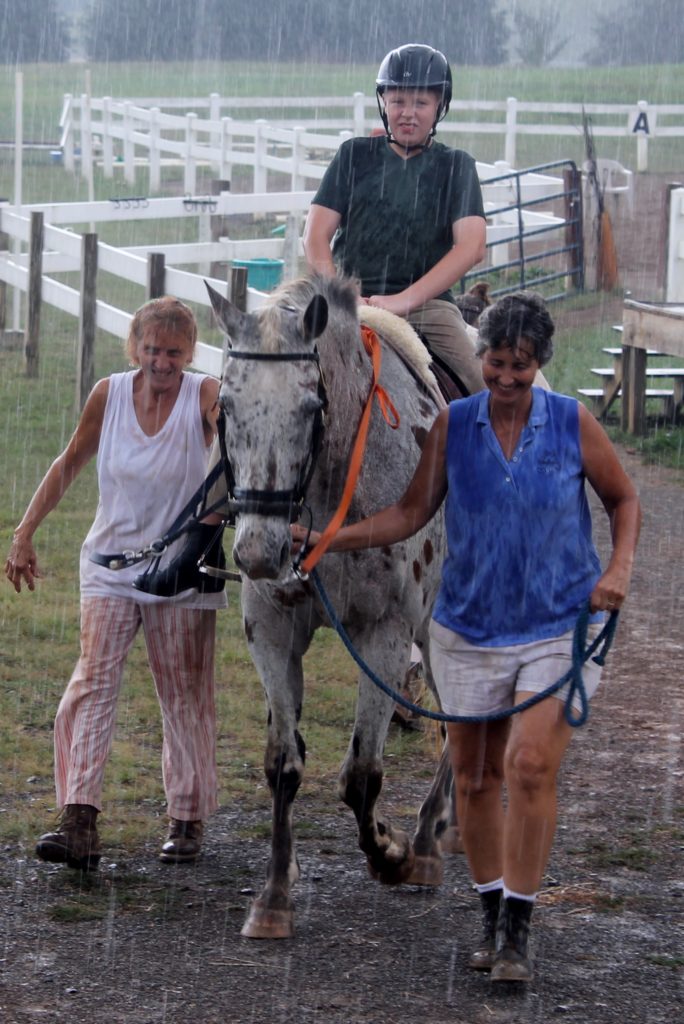The Pebble in the Pond
The freedom of riding a horse has many therapeutic benefits – physically, emotionally, mentally, and spiritually. It’s just the tip of the iceberg. At Hoofbeats, the healing process happens out of the saddle as well. Riders and volunteers build trust with the horses and form lasting friendships with each other. People don’t come and ride and leave. They invest deeply in the family and the community that is Hoofbeats.
Director Carol Branscome (right) and Instructor Maria Pennine (left) teaching on a rainy day.
“I think of what we do here as the pebble in the pond. You have that rider who comes here because everybody thinks they would benefit in some way – physically or mentally or emotionally or because they just really love the animals. But you take that one person’s experience here, and it bleeds out into the whole family. It’s the pebble that creates those concentric pebbles in the pond. You never know whom you’re going to touch.” – Carol Branscome, Director.
Social

Therapeutic Riding Association of Virginia Show, 2015
“Kind. This is a place of extraordinary kindness,” said long-time volunteer Nancy Stout. At Hoofbeats, every person – whether rider or volunteer or family member – is valued and celebrated for their unique experiences and skills. Diversity is our great strength. Children and adults from different lifestyles, parts of the country, and physical and mental abilities are team members, learning from and respecting each other.
Not all wounds are visible. Grief, bullying, isolation, and abuse have affected many of our riders and volunteers. For these deep pains, there is as much healing in the community’s joy and support as there is in the riding.
Children who experience healthy community tend to emulate it, striving for others’ success as well as their own. Hoofbeats Director Carol Branscome believes that this social network of support is essential to kids’ development.
“We were at a therapeutic riding show and the families were lined up on the rail watching their kids – in layers! I turned to the ring assistant and said, ‘Look at them, this is how you raise good kids.’ I am hoping that the experiences the kids have here make them the kind of people who don’t get envious but who cheer and work for others’ success.” – Branscome.
Physical and Mental
Many studies have shown therapeutic horseback riding to have significant physical and mental benefits for schizophrenia, autism, attention deficit disorder, MS, breast cancer, and many other situations. The movement of a horse’s walk mimics the rolling motion of a human’s walk, which supports muscle engagement and mobility. It combines physical therapy and muscle strengthening exercises with the psychotherapeutic soothing presence of a horse. As prey animals, horses have heightened sensitivity to the emotions of fear and confidence. When a rider takes a step of confidence, a horse will respond positively, reinforcing that feeling and behavior. The animals’ emotional qualities also make it possible for riders to connect with another sentient creature in a totally safe and non-judgemental context.
To Empower All
Our services go beyond weekly riding lessons. For every rider, we emphasize personal and group responsibility. Building confidence, a rider must learn to be independent, feeding, brushing and saddling his or her horse with as little assistance as possible. With every lesson, he or she gains more horse handling skills and more independence. Many of our riders have been with us for years. When they arrive at the center, they know the drill, saddling their own horse and then helping newer riders and volunteers prepare for their group lesson.
Time spent in the saddle is only a slice of the restorative experience. To ride a horse, a student has to respect his or her own independence while building a relationship with a large and powerful animal.
“There is something incredibly special and empowering about commanding the respect of an animal that weighs over ten times more than you. Horses are very sensitive to fear and to confidence. They are placing their trust in you. So you have to trust yourself.” – Branscome.

